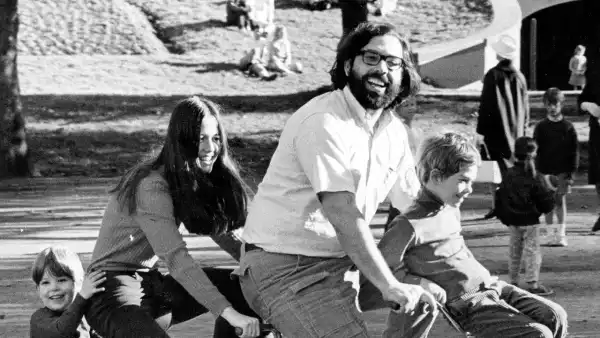
When laid out on the page in stark black ink, the songs of the Fleet Foxes have the look and feel of mid-century American poems—direct, conversational, and flecked with an emotional urgency verging on the surreal. There is an inwardness in the songs, but also an awareness of others, almost a fear of navel-gazing or self-indulgence. The speakers of these songs are wary of putting on or being perceived as putting on. Like the writing of the band’s stylistic forebears—Dylan, Cohen, Young—the lyrics of the Fleet Foxes’ Robin Pecknold are suffused with a yearning to return to a long-vanished, and perhaps entirely fictional, pastoral way of life: nature and its many facets, both beautiful and dangerous, rise to the level of a unifying character. These are folk songs, after all.
Or, I suppose, they are contemporary songs in the spirit of American folk music, with all of its Whitmanesque impulses. But, in the hands of the Fleet Foxes, the pastoral feels less like a particular zone in time and more like a space in which to parse ideas of self-reliance, the inconstancy of love, the pain of intimacy, the fear of loss, the sting of betrayal, and the strange but urgent project of hope. For instance, the early song “Sun Giant,” from the 2008 EP of the same name, has the form and structure of a traditional folk work song, right down to the theme of praising the blessing of good weather and the virtues of being alive: “What a life I lead in the summer / What a life I lead in the spring” and “What a life I lead when the sun breaks free / As a giant torn from the clouds,” and the beautiful repetition of “What a life” at the end of the second verse.
This repetition feels at first like rejoicing, and then, in the revisiting or perhaps in the greater context of the Fleet Foxes’ lyrical œuvre, the repetition harbors something of a lamentation. Because, in a Fleet Foxes song, there is always a lingering realization that time is passing, inevitably, onward and out of your hands. That every life is lost. Every moment goes on without you. Consider these lines from “Drops in the River,” also from the “Sun Giant” EP: “Crown of leaves, high in the window on a gold morning / Young today, old as a railroad tomorrow / Days are just drops in the river to be lost always.” The transience of time and the ephemeral nature of our relationships are two of the great themes of these songs. I’ve started to think of it as a Pecknoldian paradox: human relationships last only in our telling of them, and memory is what grants them meaning. Memory is all that we have amid the inconstancy of the human heart—and eventually that, too, will fail us when we need it most. We are alone.
So many Fleet Foxes songs hinge on the speaker’s realization, imagined or otherwise, that he is alone and the past is a place to which he can never repatriate. From “Innocent Son,” off the band’s self-titled début album (2008): “Rustling leaves falling beside me / On a ghost of a morning / Riding in sorrow to the harbor / Far behind, oh me, / The bodies of my friends / Hanging alone, alone again.” “Sim Sala Bim,” from the album “Helplessness Blues” (2011), ends with “Remember when you had me cut your hair? / Call me Delilah then I wouldn’t care.” In “Isles,” the speaker professes, “And I don’t even miss you at all / No, no.”
Yet, starting with the band’s third studio album, “Crack-Up” (2017), and continuing with its most recent, “Shore” (2020), the songs take on a different relationship to the past. In “Third of May / Ōdaigahara,” the speaker says, “Light ended the night, but the song remained / And I was hiding by the stair, half here, half there / Past the lashing rain / And as the sky would petal white, old innocent lies came to mind / As we stood, congregated, at the firing line.” While frankness and honesty have always been hallmarks of the speakers of Fleet Foxes songs, those qualities have often seemed self-excoriating and punitive. That is, self-revelation through the first few albums came with the heat of self-mutilation. But, here, a mature backward gaze blends an awareness of one’s own role in things going horribly wrong with a kind of openheartedness apparent in lines like “Was I too slow? / Did I change overnight?” or “How could it all fall in one day? / Were we too sure of the sun?” It’s the we that feels important there, because it implies shared culpability in the downfall of the subject being mourned. On “Shore,” songs such as “Young Man’s Game” and “Featherweight” are playful in their rueful reflections of past pretensions and the cost of masculine posturing. The nostalgia is less distorting and less brutal in the later albums, and, as such, it feels more like wisdom.
Also central to Fleet Foxes songs are what we might call Pecknoldian pairs—brothers, friends, lovers, and shadow-selves. In a Fleet Foxes song, there is the one who loves and the one who betrays. The one who flees and the one who is abandoned. Regret. Loss. The fear of committing. Sometimes the other half of a Pecknoldian dyad isn’t even another person but a different version of the speaker himself. In the early songs, this often takes the form of a self-interrogation or murder. A body lost. An argument resulting in severed communication. In the later songs, the dyad is more abstractly the speaker and himself, and the lyrics take on a more rhetorical resonance. In “Can I Believe You,” the speaker asks, “Can I believe you when you say I’m good / I didn’t need to when I wished you would / No it isn’t enough,” and “Can I believe you? / I want to need you.” It’s hard to imagine a speaker of a Fleet Foxes song ever saying that on those earlier records, when self-revelation always came with such a painful, extractive cost.
While these songs have a Jungian force to them, they are also steadfastly narrative. Rooted in a raconteur tradition, songs like “Third of May / Ōdaigahara,” “I Should See Memphis, “Maestranza,” “Mykonos,” “White Winter Hymnal,” and “Tiger Mountain Peasant Song” tell intricate stories that weave the personal together with the social and the historical, and hum with references to paintings, songs, books, and other art. There is something Chaucerian about them. The speakers are not merely delivering abstract notions of life; they move among particular forests at particular times of the day and year. We feel the snowmelt under our feet, the tinkle of ice in the air, or the salt spray of the ocean, especially in “Shore,” where so much of the album’s mood hinges on evocations of “warm American water” and “some lost coast / some bright days.” Whereas the pre-”Crack-Up” songs were more narrative in the Dylan mode—bruisers, cruisers, and bloody knuckles, people moving through the shadowy edges of society, getting their hearts and hands broke—on “Shore,” they are of a looser nature. If the other albums feel akin to a short-story collection or set of vivid vignettes, this one is somehow more novel-like, the tone more reflective and continuous. The “I” in “Wading in Waist-High Water” (“Soon as I knew you / All so wide open / Wading inside of fire / As if I just saw you”) feels like the same “I” in the “Shore” (“Kin of my kin, I rely on you / Taking me in, when a wave runs me through”). Here is a consciousness moving through a period of contemplation, reaching a place of earnest, reflective vulnerability. Fleet Foxes songs have always been that magic mix of vulnerable and tough, and there is something about the later songs, a certain opening up, that makes that vulnerability almost unbearably tender. The lyric intelligence grows and shifts and becomes aware of its place in the world; it takes on new ambitious forms and projects for itself, consuming history and the personal in equal measure.
There is always more to say about the songs that mean the most to us. After all, those songs are often what gives meaning to the moments in a life when things change or begin to change. The songs become a part of our own personal histories, and we turn to them to share bits of ourselves with others. Likewise, those songs return us to who we were at those moments in time. Fleet Foxes songs were my companions through moments of personal upheaval. They were the bedrock of my last major relationship, our way of speaking to each other. So many of these songs recall mornings I shared with an ex, making coffee and watching the sun come up or seeing the fall over Lake Mendota, in Madison. Or the winter I decided to blow up my life and pursue art. When I listen to “Crack-Up” or “Helplessness Blues,” it’s always that summer when everything shifted and deepened, and I made choices about who I wanted to be.
In the end, what matters is that these songs are alive. They seem to shiver and breathe. When you come back to a Fleet Foxes song you never quite find the same thing, and isn’t that the best kind of companion to take with you in life? One who is there, but never the same. One who can show you who you are in different ways at different moments. This is another of the band’s great themes: we are never as we once were, and we have to go on living anyway. ♦
Sourse: newyorker.com






